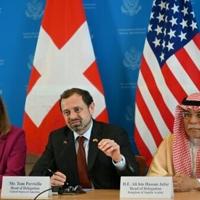Talks on the devastating war in Sudan concluded on Friday without a ceasefire, but progress was made on securing aid access on two vital routes into the country, which is currently facing one of the world’s worst humanitarian crises.
Since April 2023, a war has been ongoing between the Sudanese army, led by the country’s de facto ruler Abdel Fattah al-Burhan, and the paramilitary Rapid Support Forces (RSF), headed by his former deputy Mohamed Hamdan Daglo.
This brutal conflict has resulted in one in five people being displaced from their homes, with tens of thousands of casualties. More than 25 million people in Sudan, over half of its population, are suffering from acute hunger.
The United States initiated talks in Switzerland on August 14 with the goal of alleviating human suffering and achieving a sustainable ceasefire.
While an RSF delegation participated in the talks, the Sudanese armed forces (SAF) were dissatisfied with the format and did not attend in person, although they remained in contact with the mediators via telephone.
The talks were co-hosted by Saudi Arabia and Switzerland, with the African Union, Egypt, the United Arab Emirates, and the United Nations forming the Aligned for Advancing Lifesaving and Peace in Sudan Group (ALPS).
– Unhindered access on two routes –
“The ALPS Group secured guarantees from both conflict parties to ensure safe and unimpeded humanitarian access through two crucial routes – the Western border crossing in Darfur at Adre and the Dabbah Road with access through the north and west from Port Sudan,” stated the conclusion.
Aid trucks were en route to the Zamzam displacement camp in Darfur, where a famine has been declared.
“These routes must be kept open and safe so that we can increase aid delivery to Darfur and start to combat famine. Food and starvation should not be utilized as tools of war,” emphasized the group.
The mediators also reported progress in establishing an access route through the Sennar junction in the southeast.
The absence of the SAF at the talks “hindered our ability to make more substantial progress” towards a national ceasefire, noted the group, but they added that the door was open to both conflict parties for future discussions.
The mediation group highlighted their focus on improving the situation of civilians affected by the conflict.
“We have urged both parties, and obtained the RSF’s commitment, to issue directives to all fighters across their ranks to refrain from violations, including violence against women or children, utilization of starvation or checkpoints for exploitation, and attacks on humanitarian operations,” they detailed.
Additionally, the RSF accepted a “streamlined notification system” to facilitate humanitarian aid delivery, as indicated by the mediators.
Furthermore, a plan for ensuring compliance with agreements and resolving related disputes was presented to both warring factions.
– Hopes for steady aid –
During the talks, the government agreed to reopen the Adre crossing from Chad into Sudan’s western Darfur region – a move that aid organizations had long been advocating for. The UN humanitarian agency OCHA reported that 15 trucks had successfully crossed the border.
Tom Perriello, the US special envoy for Sudan who convened the talks in Switzerland, expressed uncertainty about whether the initial trucks signaled “the beginning of hundreds, or yet another loss of hope.”
OCHA spokesman Jens Laerke mentioned that the reopening of the crossings was “a step in the right direction.” He stressed the importance of ensuring a continuous flow of essential supplies such as food, nutrition, water, sanitation, hygiene, and medical aid to combat the worsening hunger crisis in Sudan.
Laerke disclosed that although over 130 trucks had been approved for crossing, logistical challenges and obstacles during the rainy season could disrupt the aid delivery process.
Sudan is currently grappling with outbreaks of various diseases, including measles, dengue fever, malaria, meningitis, polio, and cholera.
The World Health Organization reported securing 455,000 cholera vaccine doses to tackle a new wave of cases fueled by floods and poor sanitation. There have been 658 cases and 28 deaths in the past month, with Kassala (473) and Gedaref (110) states being the most severely impacted.
rjm/apo/rlp





